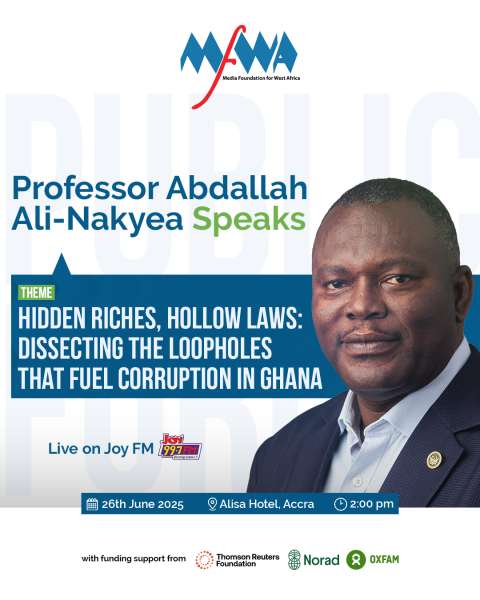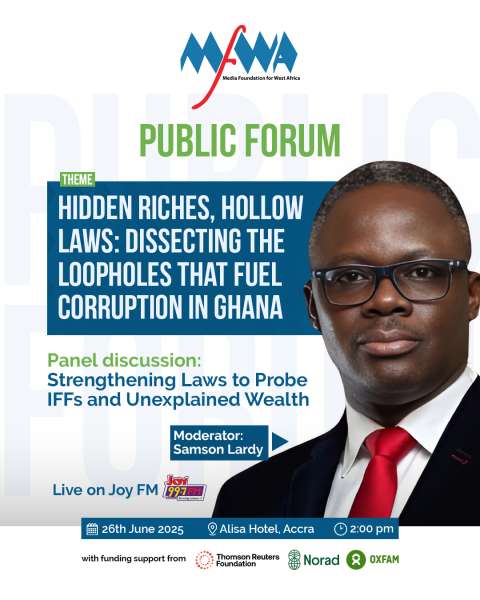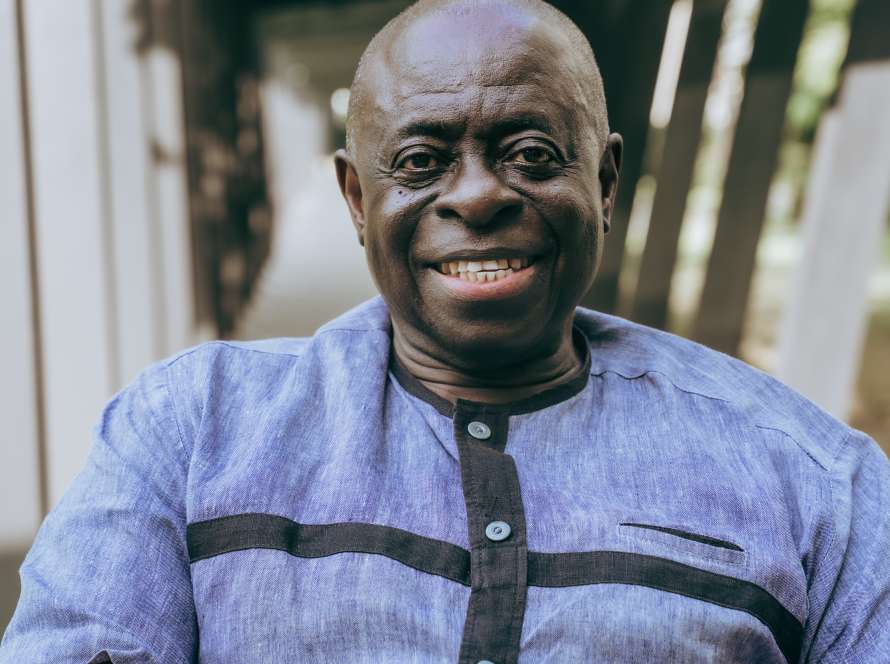The Media Foundation for West Africa (MFWA), with funding support from the Thomson Reuters Foundation (TRF) and the Norwegian Agency for Development Cooperation (NORAD) through Oxfam in Ghana, will on Thursday, June 26, 2025, host a National Multistakeholder Forum to examine and address the systemic legal and regulatory weaknesses that continue to fuel corruption in Ghana.
The forum, which will take place at 2:00 PM at the Alisa Hotel, North Ridge, Accra, is themed: “Hidden Riches, Hollow Laws: Dissecting the Loopholes that Fuel Corruption in Ghana.” It will also be broadcast live on Joy FM and streamed live on MFWA’s Facebook page.

The forum will feature a keynote address by Professor Abdallah Ali-Nakyea, Associate Professor of Law of Taxation at the University of Ghana School of Law, and a high-level panel discussion on the sub-theme: “Strengthening Laws to Probe Unexplained Wealth and Illicit Financial Flows (IFFs).”
 Despite Ghana’s adoption of multiple anti-corruption laws including Public Procurement Act 2003 (Act 663), the Anti-Money Laundering Act, 2008 (Act 749) and the Office of the Special Prosecutor Act 2017 (Act 959), corruption remains deeply rooted in both public and private sectors.
Despite Ghana’s adoption of multiple anti-corruption laws including Public Procurement Act 2003 (Act 663), the Anti-Money Laundering Act, 2008 (Act 749) and the Office of the Special Prosecutor Act 2017 (Act 959), corruption remains deeply rooted in both public and private sectors.
From sole-sourced contracts and unregulated political financing to weak enforcement of asset declaration laws, the country’s legal and institutional frameworks are riddled with loopholes that have allowed corrupt practices to persist and even flourish.
According to the 2023 Corruption Perceptions Index (CPI) by Transparency International, Ghana scored 43 out of 100, ranking 70th out of 180 countries; a sign of stagnation despite numerous reforms.
Research institutions and Civil Society Organisations continue to highlight a significant disconnect between the intent of Ghana’s anti-corruption laws and their implementation. In this regard, the National Multistakeholder Forum seeks to comprehensively examine the legal and institutional loopholes that facilitate both public and private sector corruption in Ghana.
By identifying the key weaknesses in existing anti-corruption frameworks such as gaps in procurement oversight, enforcement challenges, and unregulated political financing, the forum aims to provide a platform for national reflection and policy dialogue.
Additionally, the forum will serve to strengthen the capacity of civil society organisations, journalists, and independent bodies to more effectively hold duty-bearers accountable.
The forum will also prioritise the development of practical, evidence-based policy proposals that can inform legislative and institutional reforms.
Stakeholders including legal and governance experts, policymakers, journalists, civil society actors, and accountability institutions will be in attendance to unpack the disconnect between Ghana’s anti-corruption structures and the realities of implementation.






